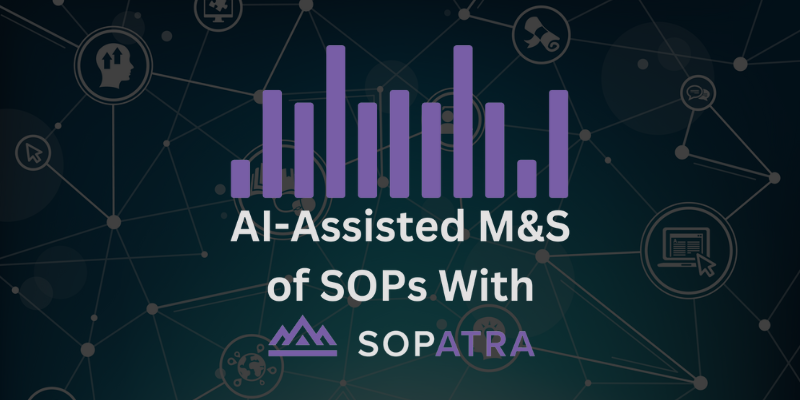How to Write Effective SOPs for Systems Engineering
Standard Operating Procedures (SOPs) play a vital role in systems engineering, ensuring that complex processes are carried out efficiently and...

Don't feel like reading? Watch the webinar recording instead!
In today's fast-paced technological landscape, the integration of artificial intelligence (AI) into operational processes is revolutionizing how organizations approach standard operating procedures (SOPs). One of the most innovative tools in this domain is Sopatra, a project that emerged from a collaboration between NASA's Small Business Technology Transfer (STTR) program and George Mason University.
This blog explores how Sopatra leverages AI to enhance the modeling and simulation of SOPs, ultimately improving operational efficiency and safety.
Sopatra was born out of a need to streamline and enhance the analysis of SOPs, particularly in complex operational environments such as aviation. The STTR program played a crucial role in this development, allowing small businesses to partner with research institutions to bring innovative solutions to market.
Harnessing the expertise of George Mason University, SPEC Innovations created Sopatra, a tool that could not only model SOPs but also simulate their execution in real-time.
Standard Operating Procedures are essential for ensuring consistency and safety in operations. They provide a structured approach to tasks, detailing the steps required to achieve specific outcomes. However, traditional SOPs often lack the flexibility and adaptability needed to respond to dynamic environments.
This is where Sopatra comes into play, transforming static documents into interactive, executable models.
Related Page: The Ultimate Guide to SOPs
At the heart of Sopatra's capabilities is its use of AI techniques, particularly natural language processing (NLP). This technology allows Sopatra to analyze written SOPs and convert them into behavioral diagrams that can be executed through simulation.
By employing Monte Carlo and discrete event simulation methods, Sopatra accounts for variations in decision-making processes, time delays, and other factors that can impact operational performance.
Sopatra provides users with a standard dashboard that allows operators and systems engineers to visualize and interact with SOPs. This feature enhances understanding and facilitates better decision-making.
The tool converts SOPs into behavioral diagrams, making it easier to identify and analyze the relationships between different actions and actors involved in a procedure.
Sopatra's ability to simulate SOP execution enables organizations to test various scenarios and outcomes, identifying potential issues before they arise in real-world operations.
Sopatra supports the integration of various data formats, allowing users to import and analyze information from different sources, enhancing the depth of analysis.
The applications of Sopatra are vast, particularly in industries where safety and precision are paramount, such as aviation, healthcare, and manufacturing. By utilizing AI-assisted modeling and simulation, organizations can:
The integration of AI into the modeling and simulation of SOPs represents a significant advancement in operational efficiency and safety. Sopatra stands at the forefront of this transformation, offering a powerful tool that not only enhances the analysis of SOPs but also prepares organizations for the complexities of modern operations. As industries continue to evolve, the adoption of AI-assisted solutions like Sopatra will be crucial in navigating the challenges ahead.
In a world where precision and safety are non-negotiable, Sopatra is paving the way for smarter, more efficient operational practices. Embracing this technology is not just an option; it is a necessity for organizations aiming to thrive in an increasingly complex environment.
Have questions about model-based systems engineering or requirements management? Talk to an expert and see how Innoslate can streamline your projects from start to finish.

Standard Operating Procedures (SOPs) play a vital role in systems engineering, ensuring that complex processes are carried out efficiently and...

Traditional Standard Operating Procedures (SOPs) often fail to account for human performance variability and real-world time constraints, leading to...
.png)
Not in the mood to read? Watch the webinar recording!